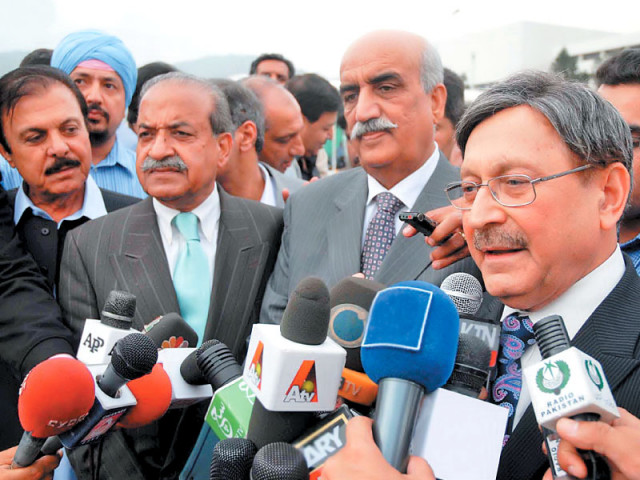Election 2013: 4 days on, no caretaker PM in sight
“We will put in all our efforts to decide the issue at this forum,” says Naek.

Members of the parliamentary committee address the media after the meeting in Islamabad. PHOTO: ONLINE
The first meeting of the parliamentary committee tasked to pick out a consensus caretaker prime minister remained inconclusive – but its members hope they would reach an agreement over the remaining two days.
“We have a firm belief that the committee will decide the matter, at least with majority if not (by evolving) consensus,” said Pakistan Muslim League-Nawaz’s Sardar Mehtab Abbasi at a news conference after the committee meeting on Wednesday.
Pakistan Peoples Party Senators Farooq H Naek and Syed Khursheed Ahmed Shah agreed with Abbasi. “We will put in all our efforts to decide the issue at this forum,” said Naek.
In its first meeting, the committee decided the terms of reference for its subsequent meetings. Under the terms, the government and opposition will chair meetings on rotation. Awami National Party’s Haji Ghulam Ahmed Bilour, who represents the government on the panel, chaired the first meeting.
“Since, this was our first meeting, we had to formulate certain rules that we will follow while finalising a name for the interim prime minister,” Khursheed Shah told reporters. “We have started a discussion over the merits and demerits of the nominees,” he added.
According to Shah, under the terms of reference, a decision on any candidate will be made based on six out of the total eight votes. He added that a meeting quorum of five members was also agreed upon.
The committee also discussed two nominees out of four in the first meeting, namely Justice (Retd) Mir Hazar Khan Khoso and Rasul Bakhsh Palijo, said Shah, adding that the names of Dr Ishrat Hussain and Justice (Retd) Nasir Aslam Zahid will be discussed in today’s (Thursday’s) meeting.
Justice (Retd) Mir Hazar Khan Khoso and Dr Ishrat Hussain have been nominated by the PPP, while Justice (Retd) Nasir Aslam Zahid and Rasool Baksh Palijo were nominated by the PML-N.
During his news conference, Abbasi clarified the procedure which the panel will use to select the interim premier.
“The caretaker prime minister must have five qualities … He should be impartial, honest, experienced in running government affairs, have no political affiliation and the public should have a positive perception of him,” Abbasi said.
He deflected a question as to why the leader of opposition opted against nominating members from any other parties in the opposition apart from the PML-N for the parliamentary panel, saying there was no constitutional bar in this regard.
Published in The Express Tribune, March 21st, 2013.



















COMMENTS
Comments are moderated and generally will be posted if they are on-topic and not abusive.
For more information, please see our Comments FAQ